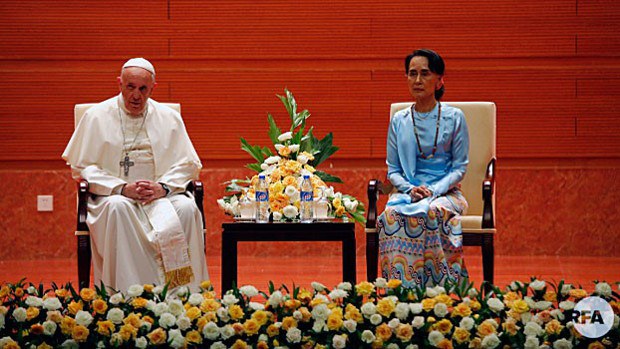Pope Refrains from Uttering ‘Rohingya’ in Meeting with Myanmar’s Leader
2017.11.28
 Pope Francis and de facto Myanmar leader Aung San Suu Kyi sit during an event in Naypyidaw, Nov. 28, 2017.
Pope Francis and de facto Myanmar leader Aung San Suu Kyi sit during an event in Naypyidaw, Nov. 28, 2017.
Pope Francis urged Myanmar’s leaders Tuesday to respect human rights, in a veiled reference to the country’s persecuted Rohingya Muslims who have been targeted in a violent military crackdown that has forced hundreds of thousands to flee to neighboring Bangladesh.
The pontiff refrained from using the term “Rohingya” in discussions with officials, including State Counselor Aung San Suu Kyi, on the second day of his visit to Myanmar. On Thursday, Francis will travel on to Bangladesh, where he will to stay for three days and is scheduled to meet with a group of Rohingya refugees in Dhaka.
Myanmar views the Rohingya as illegal immigrants from Bangladesh and refers to them disparagingly as “Bengalis.”
Cardinal Charles Maung Bo, the Catholic archbishop of Yangon, had cautioned Pope Francis not to use the highly divisive word during his four-day visit to Myanmar.
“The future of Myanmar must be peace, a peace based on respect for the dignity and rights of each member of society, respect for each ethnic group and its identity,” the pope said, addressing Myanmar’s de factor leader Aung San Suu Kyi and diplomats in the capital Naypyidaw, according to the New York Times.
On Monday, Senior Gen. Min Aung Hlaing, Myanmar’s military commander-in-chief, told the pontiff that no religious or ethnic discrimination existed in Myanmar despite evidence and allegations of ethnic cleansing in northern Rakhine where a military crackdown has driven more than 624,000 Rohingya to seek shelter in Bangladesh since late August.
Rights groups and some of the refugees who fled to southeastern Bangladesh have accused soldiers of indiscriminate killings, torture, rape, and arson, though both the army and the Myanmar government have denied the allegations.
Rights groups also have published satellite images documenting the destruction of villages.
The pope spoke publicly in late August about the persecution of the Muslim minority just after the military began its crackdown on the Rohingya in northern Rakhine in response to deadly attacks on police outposts by Arakan Rakhine Salvation Army (ARSA) insurgents.
For decades, Myanmar has subjected the Rohingya to systematic discrimination by depriving them of citizenship and access to basic services, though many have lived in the country for generations.
After initial reports surfaced in late August of Rohingya fleeing the army crackdown in Rakhine, Pope Francis publicly said he was saddened by the news “of the persecution of a religious minority, our Rohingya brothers and sisters.”
But on Tuesday, his public statements deliberately avoided any mention of the group or the violent campaign recently waged against it in ethnically and religiously divided Rakhine state.
“Unity is always a product of diversity,” the pope told religious leaders representing different faiths in the commercial capital Yangon, the online journal The Irrawaddy reported, citing a briefing by Vatican officials.
“Everyone has their values, their riches as well as their differences, as each religion has its riches, its traditions, its riches to share,” Pope Francis said. “And this can only happen if we live in peace, and peace is constructed in a chorus of differences.”
After the pope leaves Myanmar on Thursday, he will head to Bangladesh where he will meet with a group of Rohingya in the capital Dhaka.
Applications to return
The pope arrived in Myanmar less than a week after Naypyidaw and Dhaka signed a bilateral agreement for the voluntary repatriation of some 700,000 Rohingya displaced by the August crackdown in northern Rakhine state and an earlier campaign in October 2016.
The agreement, however, did not include information about the use of temporary shelters for those who opt to return to Myanmar where their previous homes have been burned down.
On Tuesday, Myint Kyaing, a permanent secretary of Myanmar’s Ministry of Labor, Immigration and Population, told the Myanmar Service of Radio Free Asia, a sister entity of BenarNews, that the new agreement was based primarily on an existing one from 1993. Under that one, Myanmar agreed to accept back refugees from Bangladesh if they could prove previous residency in the country.
The agreement does not identify the Rohingya by their ethnic group’s name.
“We are going to check and accept people who really lived in Myanmar,” Myint Kyaing said. “We gave cards or documents to each of them. If they can’t show them, then we have a list of people who lived in the region with numbers in each household and their photos. The immigration ministry collects this list every year.”
Some rights groups have surmised that many Rohingya refugees failed to take their identification documents with them as they fled their burning villages in northern Rakhine during the two crackdowns.
Those who plan to return to Myanmar must complete application forms and submit them with their photos, Myint Kyaing said.
“We will check their forms against the documents and photos we have,” he said. “If we find that they really lived in Myanmar and they were not involved with any terrorist group, then they will be accepted.”







